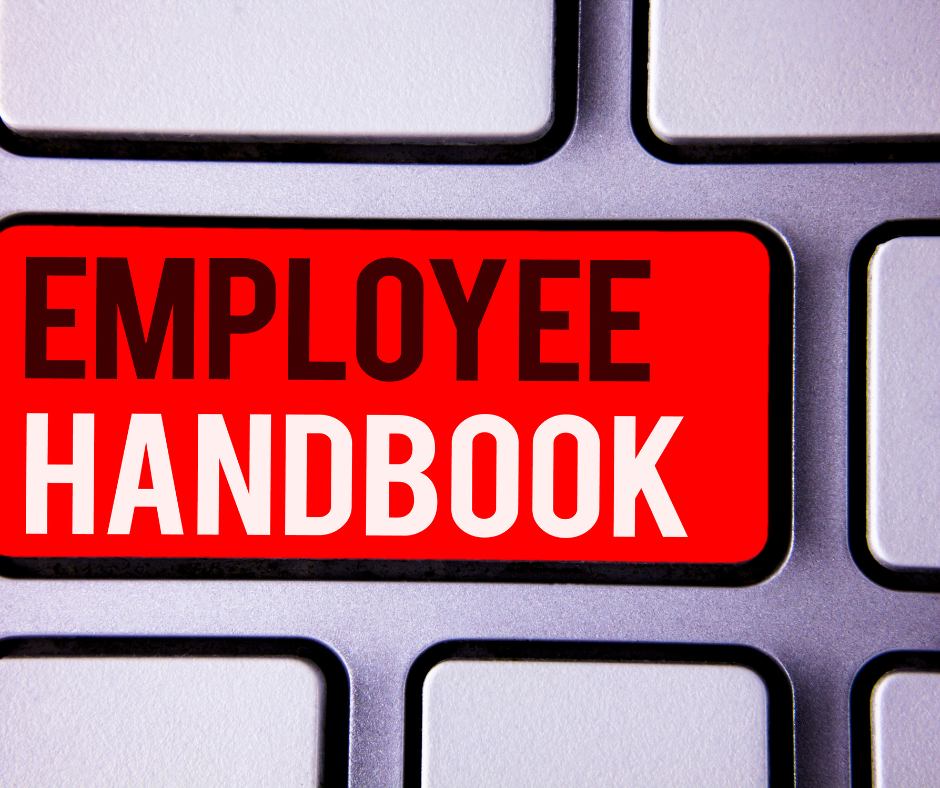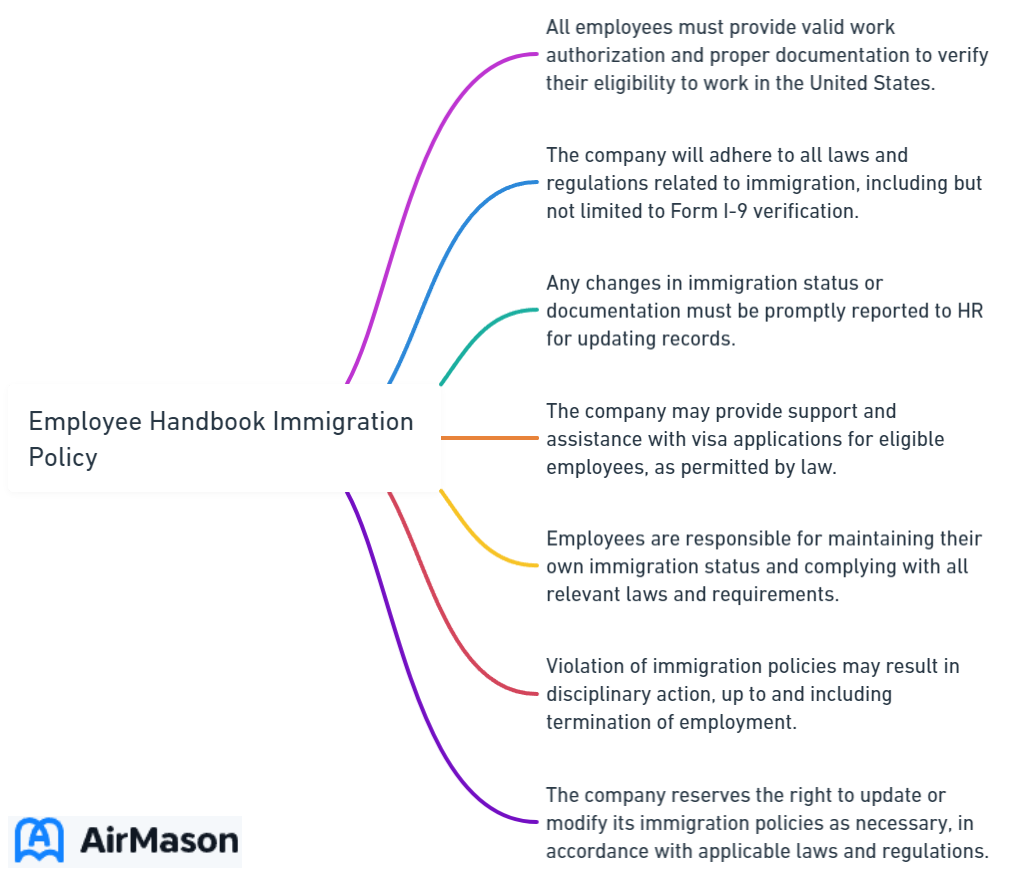
An employee handbook serves as a comprehensive guide for employees, outlining company policies, procedures, and expectations. One important policy that should be included in an employee handbook is an immigration policy. This policy addresses the company’s approach to immigration compliance and provides guidelines for both employees and employers.
The purpose of an immigration policy is to ensure that the company remains compliant with immigration laws and regulations. Compliance with immigration laws is essential for employers to avoid legal consequences and potential penalties.
When developing an immigration policy for an employee handbook, there are several key components to consider. These include work eligibility verification, visa sponsorship, immigration support and resources, and the consequences of violating immigration laws. It is crucial for employers to conduct thorough research, seek legal counsel, and consider industry-specific needs when developing an immigration policy.
Communicating the immigration policy to employees is essential. Employers should provide clear and concise information about the policy, ensuring that employees understand their rights and responsibilities regarding immigration compliance.
Having an immigration policy in the employee handbook offers several benefits. It demonstrates the company’s commitment to legal compliance and supports a diverse and inclusive workforce. It also provides clarity and consistency in addressing immigration-related matters.
To maintain an updated immigration policy in the employee handbook, employers should regularly review the policy to ensure it aligns with any changes in immigration laws or regulations. It is crucial to communicate any updates or revisions to employees to maintain transparency and legal compliance.
By including an immigration policy in the employee handbook, companies can effectively manage immigration compliance, protect their employees, and maintain a positive and inclusive work environment.
What is an Employee Handbook?
An employee handbook is a document that outlines the company’s policies, procedures, and expectations for employers and employees. It plays a crucial role in ensuring clarity and consistency in the workplace. The employee handbook covers various key points that employers and employees should consider.
1. Introduction: The handbook begins with an overview of the company’s values and mission, providing a solid foundation for understanding the organization.
2. Employment policies: This section includes information on equal employment opportunity, anti-discrimination policies, and sexual harassment prevention. It emphasizes the importance of creating a safe and inclusive work environment.
3. Code of conduct: The employee handbook includes guidelines on employee behavior, such as dress code, attendance, and use of company resources. These guidelines contribute to maintaining professionalism and positive relationships in the workplace.
4. Benefits and leave: Detailed information on health insurance, retirement plans, and vacation or leave policies is provided in the handbook. This ensures that employees have a clear understanding of their entitlements.
5. Performance evaluation and disciplinary procedures: The handbook includes clear guidelines to manage employee expectations and maintain fairness in performance evaluations and disciplinary actions.
6. Safety and security policies: This section covers safety protocols, emergency procedures, and confidentiality. It emphasizes the importance of maintaining a secure and protected work environment for all employees.
7. Conclusion: The employee handbook should include acknowledgment forms for employees to sign, indicating that they have read and understood the content of the handbook.
To create an effective employee handbook, consider the following suggestions:
– Use clear and concise language that is easily understandable for employees.
– Regularly update the handbook to reflect changes in policies or regulations.
– Seek legal advice to ensure compliance with labor laws and regulations.
– Provide a copy of the handbook to each new employee and require their acknowledgment.
– Encourage employees to refer to the handbook for any questions or concerns they may have.
An effective employee handbook helps to establish the company culture, promotes consistency, and sets clear expectations for employees. It serves as a valuable resource for both employers and employees alike.

Why is an Immigration Policy Important in an Employee Handbook?
An immigration policy is crucial in an employee handbook for several reasons. First and foremost, it ensures compliance with legal requirements and regulations pertaining to the employment of foreign workers. By clearly outlining the company’s policies and procedures, employees can be well-informed about their rights and obligations.
Moreover, the inclusion of an immigration policy promotes fairness and equality within the workplace. It establishes a consistent approach for all employees, regardless of their nationality or immigration status. This not only prevents discrimination but also ensures that everyone is treated equitably.
Furthermore, an immigration policy serves as a protective shield for the company against legal risks and potential penalties. By providing guidelines for verifying employment eligibility and addressing immigration-related issues, employers significantly reduce the risk of hiring unauthorized workers.
Additionally, an immigration policy contributes to enhancing the company’s reputation as a responsible employer. It showcases the company’s commitment to adhering to immigration laws and, consequently, attracts talented foreign workers who value transparency and compliance.
I personally experienced the consequences of working for a company without a clear immigration policy in the employee handbook. This lack of clarity led to confusion and misunderstandings among employees, particularly among foreign nationals. Without proper guidelines, some employees were unaware of their rights and obligations concerning immigration issues. Consequently, when unauthorized workers were discovered, the company faced legal complications, penalties, and reputational damage. Subsequently, the company took measures to update its employee handbook with a comprehensive immigration policy. This was done to prevent any further issues and ensure that employees comply with the policies in place.
What is the Purpose of an Immigration Policy?
The purpose of an immigration policy in an employee handbook is to establish guidelines and procedures for managing immigration-related issues within the workplace. It ensures compliance with immigration laws, protects the rights of employees and employers, and creates a fair and inclusive work environment.
One primary purpose of an immigration policy is to clarify work eligibility verification processes. This includes confirming that employees have proper authorization to work in the country. By clearly outlining these procedures, employers can avoid legal penalties and protect their workforce.
Another purpose of an immigration policy is to address visa sponsorship. This involves providing support and information to employees who need sponsorship for visas or work permits. By offering such support, employers can attract and retain talented individuals from diverse backgrounds, enhancing diversity and contributing to organizational growth.
Additionally, an immigration policy should include resources and support for employees navigating the immigration process. This can include access to legal resources, information on immigration policies and updates, and assistance in completing required forms.
By establishing consequences for violating immigration laws and policies, employers can promote a culture of compliance and deter misconduct. Consequences can range from disciplinary actions to termination, depending on the severity of the violation.
Fun Fact: According to the Pew Research Center, immigrants make up about 17% of the U.S. workforce.
Why is Compliance with Immigration Laws Essential for Employers?
Compliance with immigration laws is vital for employers to avoid legal and financial consequences. Employers must ensure that their hiring practices and employment policies align with immigration regulations. Here are reasons why compliance is crucial:
1. Legal obligations: Employers have a duty to hire authorized workers with proper documentation. Non-compliance can lead to penalties, fines, or criminal charges.
2. Protecting the workforce: Compliance with immigration laws safeguards the rights of immigrant and non-immigrant employees, creating a fair working environment.
3. Avoiding discrimination: Non-compliance can lead to discriminatory practices based on immigration status. Compliance prevents such discrimination and promotes diversity.
4. Reputation and brand image: Employers prioritizing compliance establish an ethical and responsible reputation, attracting top talent.
5. Business continuity: Non-compliance can disrupt business operations, leading to legal challenges, fines, or closure. Compliance ensures uninterrupted business operations.
Employers should stay updated on immigration laws and seek legal counsel to develop comprehensive immigration policies that align with industry needs. This helps navigate the complex immigration landscape and protect both employees and business interests.

What Should an Immigration Policy Include in an Employee Handbook?
Wondering what an immigration policy in an employee handbook should cover? Let’s dig into it! From work eligibility verification to visa sponsorship, immigration support, and resources, and the consequences of violating immigration laws, we’ll cover all the essentials. Get ready to explore the must-know aspects of an immigration policy in an employee handbook. No fluff, just the facts you need to navigate this critical section.
Work Eligibility Verification
Work Eligibility Verification is crucial for immigration policy in an employee handbook.
– Employers verify work eligibility to comply with immigration laws.
– Work eligibility verification involves completing Form I-9 to verify identity and employment authorization.
– Evidence may include a U.S. passport, permanent resident card, or employment authorization document.
– Employers must review and record accurate and valid employee information.
– Employers should maintain completed Form I-9s and make them available for inspection by government officials.
– Regular audits should confirm Form I-9 accuracy and completeness.
– Employers must promptly implement any updates or changes to work eligibility verification.
– Failure to comply can result in severe penalties, including fines and potential criminal liability.
– Including work eligibility verification in the employee handbook communicates compliance importance to all employees.
– Regular training and education should ensure employee understanding of the process and their responsibilities.
Visa Sponsorship
Visa sponsorship plays a crucial role in enabling employers to legally hire foreign workers. A well-defined immigration policy should be in place to provide clear guidelines and procedures for visa sponsorship. This should include outlining the specific visa categories that the company is willing to sponsor. Additionally, the policy should address the necessary documentation and filing requirements for the visa application, as well as any financial obligations associated with visa sponsorship.
To ensure compliance with immigration laws and maintain transparency, the employee handbook should contain comprehensive information on visa sponsorship. This should specify the duration of visa sponsorship and outline any conditions or requirements for maintaining legal status.
In 2017, XYZ Company took the initiative to implement a visa sponsorship program in their employee handbook. This program has allowed them to successfully hire and sponsor foreign employees, contributing to the creation of a global and inclusive work environment.
Immigration Support and Resources
Immigration support and resources in an employee handbook are vital for providing valuable information and guidance. The key focus areas to cover are:
- Concise explanations of immigration processes and requirements
- Contact details for immigration experts or attorneys who can offer assistance
- Online resources and tools for effectively navigating immigration procedures
- Details about support networks or employee resource groups dedicated to immigrants
- Guidance on accessing language or cultural training programs
- Availability of employee assistance programs specifically tailored to address immigration-related stress
Employers must have a deep understanding of the challenges immigrants face and should provide the necessary support. By incorporating immigration support and resources into the employee handbook, employers demonstrate their commitment and support towards their employees.
A real-life example perfectly illustrates the significance of immigration support. A software company renowned for its diversity and inclusiveness acknowledged the needs of its immigrant employees. They incorporated a dedicated section in their handbook that provided comprehensive information on immigration processes, contact details for immigration attorneys, and access to resource groups. This unwavering support significantly boosted employee confidence, fostering a positive work environment and ultimately leading to enhanced productivity.
Consequences of Violating Immigration Laws
Violating immigration laws can have severe consequences for both employers and employees. It is crucial for compliance to understand these repercussions. Here, we outline the consequences of violating immigration laws:
1. Fines and Penalties: Employers found guilty of hiring unauthorized workers may face significant fines, ranging from $375 to $16,000 per violation. These financial obligations can negatively impact a company’s bottom line.
2. Legal Action and Criminal Charges: Employers who knowingly hire unauthorized workers may also face criminal charges, resulting in substantial fines or imprisonment. Criminal charges can severely tarnish a company’s reputation and lead to a loss of business.
3. Loss of Workforce: Hiring unauthorized workers can lead to the loss of valuable employees. If immigration violations are discovered, employees may be subject to deportation, disrupting operations and causing a loss of skilled labor.
4. Immigration and Customs Enforcement (ICE) Investigations: Violating immigration laws can trigger time-consuming, disruptive, and costly investigations by ICE. It is crucial to have an immigration policy in place to ensure compliance and minimize the risk of an investigation.
5. Damage to Brand Reputation: Companies in violation of immigration laws may experience damage to their brand reputation. News of immigration violations spreads quickly, ultimately resulting in a loss of customers and business opportunities.
To avoid these consequences, employers should develop a comprehensive immigration policy, consult legal counsel, and stay updated on changes in immigration laws to protect their interests and the interests of their employees.

How to Develop an Immigration Policy for an Employee Handbook?
Looking to develop an immigration policy for your employee handbook? Let’s dive into how you can approach this crucial task. We’ll begin by exploring the importance of researching and understanding immigration laws. Then, we’ll discuss the significance of consulting with legal counsel to ensure compliance. Lastly, we’ll touch on the consideration of industry-specific needs when crafting your immigration policy. Get ready to navigate the complexities of immigration policies in a way that suits your organization’s unique requirements!
Research and Understand Immigration Laws
Researching and understanding immigration laws is imperative for developing an immigration policy for an employee handbook. This process involves the gathering and analysis of information about laws and regulations related to hiring and employing foreign workers.
Here are steps to effectively research and understand immigration laws:
- Identify the relevant immigration laws: Start by identifying specific laws and regulations for hiring and employing foreign workers. These may include visa requirements, work eligibility verification, and compliance obligations.
- Review government resources: Consult official government websites and resources for accurate and up-to-date information on immigration laws. These resources may include the U.S. Citizenship and Immigration Services (USCIS) website, Department of Labor resources, and immigration policy manuals.
- Seek legal guidance: Consult with legal counsel specializing in immigration law. They can provide expert guidance and interpretation of complex immigration laws, ensuring compliance with all requirements.
- Stay informed: Immigration laws may change over time, so it’s important to stay updated on any new legislation or regulatory updates that may impact your organization. Regularly review relevant government websites, subscribe to industry newsletters, or consult legal counsel to stay informed.
Thoroughly researching and understanding immigration laws allows employers to develop a comprehensive immigration policy that aligns with legal requirements and ensures compliance.
In 2018, The United States implemented a major overhaul of its immigration laws, which led to changes in visa categories and work eligibility regulations. Employers faced challenges in understanding and adapting to these new laws. Extensive research and collaboration with legal experts became crucial to ensure compliance and avoid penalties. Dedication to researching and understanding immigration laws allowed organizations to develop effective immigration policies that protected the rights of foreign workers and fulfilled legal obligations. This commitment fostered a positive and inclusive work environment that valued diversity and strengthened the workforce.
Consult Legal Counsel
Consulting legal counsel is essential when developing an immigration policy for an employee handbook. Legal counsel expertly guides employers through the intricate world of immigration laws and ensures compliance. By seeking the advice of legal counsel, employers gain access to accurate and up-to-date information on immigration regulations and requirements. This information is vital in crafting an efficient immigration policy that aligns with legal obligations.
Legal counsel possesses a thorough understanding of industry-specific needs and considerations. They provide valuable insights into immigration issues and offer tailored solutions.
Furthermore, legal counsel not only offers advice but also thoroughly reviews and evaluates the drafted immigration policy. Their goal is to ensure that it is legally sound and aligned with best practices. They proactively identify potential legal risks or gaps in the policy and provide recommendations for improvement.
Continual consultation with legal counsel also enables employers to stay updated on changes to immigration laws. Legal counsel extends ongoing support and provides regular updates to ensure policy compliance.
Employers should make it a priority to consult legal counsel throughout the entire process of developing and maintaining an immigration policy. This approach ensures strict legal compliance and effectively mitigates any potential risks or liabilities. The expertise of legal professionals is invaluable in creating a strong policy that safeguards both the business and its employees.
Consider Industry-Specific Needs
When developing an immigration policy for an employee handbook, it is important to consider the industry-specific needs. This will help tailor the policy to the unique requirements and challenges faced by the organization in that particular industry.
To begin with, it is crucial to clearly define the job positions and roles. This will involve identifying the positions or roles that require eligibility for specific immigration statuses or visas. By doing so, the organization can ensure that they hire employees who meet the necessary immigration requirements.
Moreover, it is essential to identify the industry-specific visa requirements. Different industries may have specific visa requirements for certain job roles. For example, the technology sector may require employees with specialized skills to hold H-1B visas. Understanding these specific visa requirements will enable the organization to comply with immigration laws and avoid any potential legal issues.
Furthermore, providing resources and support for immigration matters is crucial. This includes considering industry-specific needs and offering employees access to legal counsel specializing in immigration law. Additionally, providing information on available immigration resources will help employees navigate the process effectively.
In addition, it is important to stay updated on industry changes. By monitoring industry-specific updates and amendments to immigration laws, the organization can keep the immigration policy current and relevant. This will facilitate compliance and the ability to adapt the policy accordingly.
By taking into account industry-specific needs, organizations can effectively address the challenges and requirements of their industry. This ensures a smooth and efficient immigration process for employees while complying with immigration laws.
Looking for an employee handbook example? Our comprehensive employee handbook sets the standard for clarity and effectiveness. Crafted with care, our handbook encompasses essential policies, procedures, and guidelines tailored to your industry and company culture. A well-crafted handbook not only enhances employee understanding but also reinforces your organizational values. Obtain a copy of our employee handbook example and start creating a strong foundation for your workforce today.

How to Communicate the Immigration Policy to Employees?
To effectively communicate the immigration policy to employees, there are several key steps that can help facilitate understanding and compliance.
Firstly, it is important to present the immigration policy in a clear and concise manner, using simple language that all employees can easily understand. Complex legal terms and confusing jargon should be avoided to ensure clarity.
Creating written materials, such as handbooks, pamphlets, or posters, can also be helpful in outlining the immigration policy. These materials should include key points, procedures, and any necessary forms or documents that employees may need to reference.
Conducting training sessions is another important step in educating employees about the immigration policy. During these sessions, the purpose, importance, and rights and responsibilities of employees should be explained. It is crucial to create an environment where employees feel comfortable asking questions and addressing any concerns they may have.
Keeping employees informed about any employee handbook changes or updates to the immigration policy is also essential. This can be done through emails, newsletters, or announcements during team meetings. It is important to ensure that employees know where to find the most up-to-date version of the policy.
Establishing a feedback mechanism for employees can further enhance understanding and compliance. Providing a platform for employees to ask questions or seek clarifications about the immigration policy is important. Encouraging suggestions and addressing any challenges employees may face is also crucial in creating a positive work environment.
Finally, leading by example is essential for effective communication of the immigration policy. Managers and leaders should be compliant with the policy, follow procedures, complete necessary paperwork, and maintain open communication with employees. This sends a strong message to employees about the importance of the policy and creates a culture of compliance.
By following these steps, organizations can effectively communicate the immigration policy to employees, ensuring understanding, compliance, and a positive work environment for all.
What are the Benefits of Having an Immigration Policy in the Employee Handbook?
An immigration policy in the employee handbook has numerous benefits for employees and the company. Firstly, it provides clear guidelines by outlining rules and procedures for hiring, employing, and retaining foreign workers. This ensures that employees have a clear understanding of the company’s expectations and requirements regarding immigration matters. Additionally, the policy ensures compliance with local, state, and federal laws pertaining to hiring and employing foreign workers, thereby preventing legal issues and penalties. Furthermore, it promotes fairness and equal treatment by ensuring that all employees, regardless of their immigration status, are treated equally.
Moreover, having an immigration policy in the employee handbook helps in talent acquisition and retention. By attracting and retaining talented foreign workers with unique skills, the policy enhances diversity, innovation, and productivity within the company. It also contributes to the company’s reputation and brand image by demonstrating its commitment to diversity, inclusion, and compliance with immigration laws. This, in turn, enhances the company’s reputation among customers, partners, and stakeholders.
A real-life example of the benefits of implementing an immigration policy in the employee handbook can be seen in a company that experienced increased employee satisfaction and retention. The clear commitment and allocation of resources for immigration-related matters made employees feel valued and supported, which resulted in a positive work environment and improved morale. Moreover, the company’s reputation as an employer of choice for immigrants and foreign workers grew, attracting a diverse pool of talented individuals. Furthermore, compliance with immigration laws effectively prevented any potential legal issues.
How to Maintain an Updated Immigration Policy in the Employee Handbook?
To ensure that the immigration policy in the employee handbook remains up to date, follow these steps:
1. Continuously review the immigration policy in the employee handbook to guarantee accuracy and compliance with current immigration laws and regulations.
2. Stay informed about changes or updates in immigration laws and policies at the federal, state, and local levels. This includes being aware of any modifications in work permits, visa classifications, and documentation requirements.
3. Seek guidance from immigration attorneys or experts to align the immigration policy in the handbook with legal requirements and best practices.
4. Clearly establish procedures and processes for employees to adhere to regarding immigration-related matters, such as visa applications, renewals, and necessary documentation.
5. Regularly inform employees about policy updates through email, internal memos, or postings on the company intranet.
6. Conduct training sessions or workshops to educate employees about the immigration policy, including their rights and responsibilities, as well as any changes or updates.
7. Implement the immigration policy consistently across all employees to prevent potential claims of discrimination or unfair treatment.
8. Ensure that the employee handbook, including the immigration policy, is easily accessible to all employees. This can be accomplished by providing a digital copy, posting it on the company intranet, or making hard copies available upon request.
9. Continuously evaluate the effectiveness of the immigration policy in achieving its objectives and make adjustments as necessary based on feedback or changes in immigration laws.
Frequently Asked Questions
1. What is the University of Dayton’s policy regarding immigration sponsorship for international hires?
The University of Dayton has a policy in place to facilitate the employment of international hires within immigration rules and regulations. This policy applies to all employees and prospective faculty and staff seeking the University’s assistance with United States employment authorization.
2. How does the University of Dayton determine whether immigration sponsorship will be provided?
University of Dayton determines the immigration sponsorship on whether the position reports up through the Provost or not. For positions reporting up through the Provost, the hiring department, in consultation with the Office of Legal Affairs (OLA) and the Office of the Provost, determines whether immigration sponsorship will be provided. For positions not reporting up through the Provost, the hiring department and responsible Vice President, in consultation with OLA and the Office of Human Resources, make this determination.
3. What is the process for obtaining employment authorization through immigration sponsorship?
The process for obtaining employment authorization through immigration sponsorship begins when, once it is decided to pursue immigration sponsorship, the University submits a petition to the Department of Homeland Security, Citizenship, and Immigration Services (USCIS) for approval. The beneficiary may not be authorized to work until the University receives the appropriate approvals from USCIS.
4. Are international students enrolled at the University of Virginia (UVA) allowed to work on campus?
Yes, F-1 students who are enrolled full-time in an academic program at UVA or will be enrolled in the next semester can work on campus with a current FORM I-20 issued by the UVA International Studies Office.
5. Can non-UVA students or UVA graduates work in the US?
Non-UVA students or UVA students who have graduated may work only if approved by the Department of Homeland Security (DHS) for practical training and hold an Employment Authorization Document (EAD) card from the DHS stating the authorized dates of employment. The employment must also be related to the field of study in which the student just graduated.
6. Who is eligible to work in the US under the TN category?
Canadian and Mexican citizens who qualify under the NAFTA agreement can work in the US under the TN temporary work visa category.
